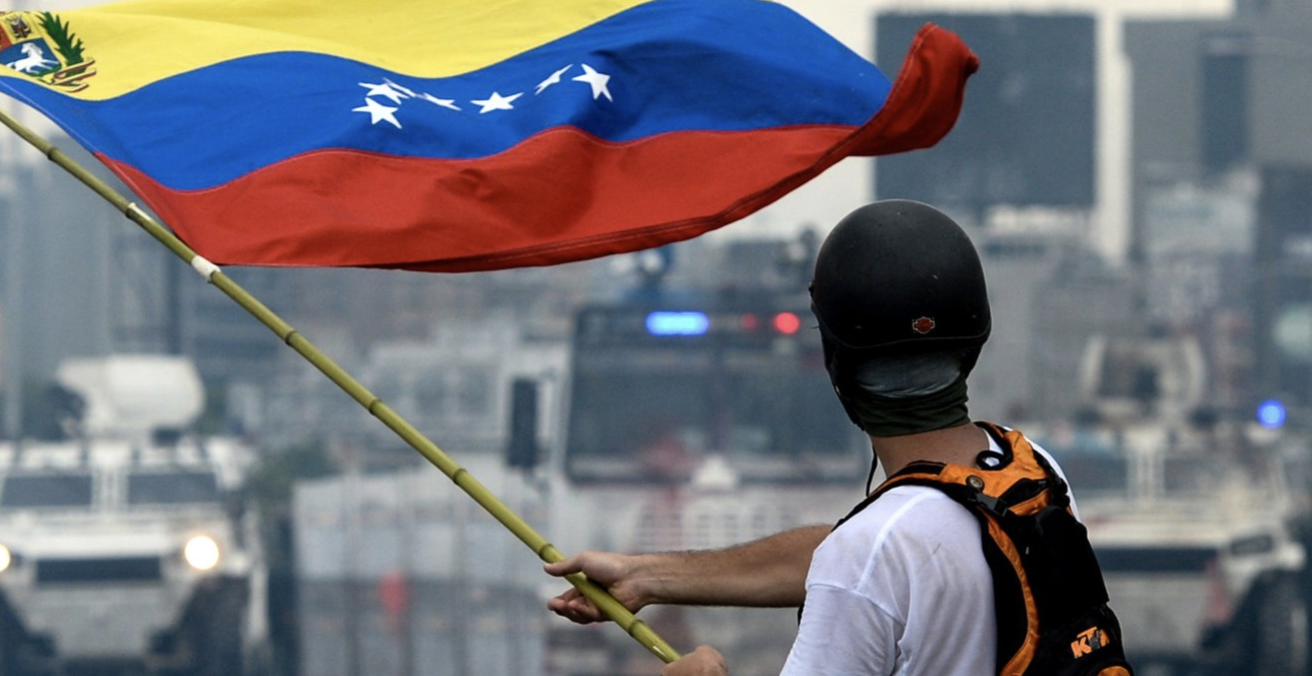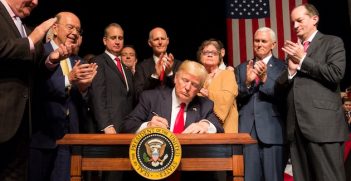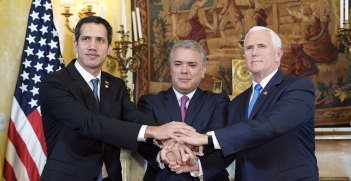The Venezuelan Crisis: Assessing Regional Intervention in South America

If the crisis in Venezuela escalates to an armed stand-off between forces loyal to President Maduro and opposition factions loyal to Guaidó, a rare case of foreign intervention in South America may be likely.
The Venezuelan National Assembly, the country’s only legislative chamber, recently declared Nicolás Maduro’s presidency illegitimate and called for him to stand down. This declaration is based on the contested legitimacy of recent elections which brought Maduro to power. As the constitution calls for the head of the National Assembly to act as the president when the position is vacant, the speaker of the house and leader of the opposition, Juan Guaidó, declared himself interim-president on January 23. Guaidó has since been recognized as leader of an interim-government by the Organization of American States (OEA) and several other nations, including the United States and the United Kingdom.
This development has been welcomed by Venezuela’s neighbours, especially those more directly affected by its economic, political and social crisis. The Assembly’s move has given the international community the opportunity to take further steps in developing alternatives for the crisis. As a democratically elected body, it provided a much-needed air of legitimacy to the uneasy process of replacing Maduro that so many states desire.
Recent changes in South America’s political make-up have certainly played a part in influencing the Venezuelan opposition to increase its defiance of the regime. In Colombia, the decades-long guerrilla conflict perpetrated by Marxist terrorist groups has been considerably neutralized and now poses a far-diminished threat to the Colombian government. Many of these groups have deep connections with Venezuela’s regime and were considered potential allies in the so-called “fight against imperialism.”
In Brazil – South America’s most economically developed country, which holds regional leadership aspirations – Jair Bolsonaro’s election was achieved with the help of strong criticism of the leftist policies of his predecessors, who had played an important role in preserving the Venezuelan regime since the early days of Hugo Chavez. Criticism towards Venezuela was an intrinsic part of his campaign and it was argued his predecessors and campaign opponents wanted to “transform Brazil into a Venezuela”.
Brazil and Colombia are most directly affected by their neighbour’s economic meltdown, especially in cities close to the border where millions of Venezuelans have fled, resulting in problems with over-population, undocumented immigrants and outbursts of xenophobic violence. Both Brazil and Colombia are now pressuring Maduro to resign and have already taken strong measures to openly oppose his presidency. This is alongside other nations and international organisations like the OEA and the Lima Group, an initiative of 11 Latin American nations (plus Canada) created to search for solutions to the crisis.
However, as new developments unfold, violence might soon replace diplomatic and economic pressure. Maduro has already vowed to resist by all means and suspended diplomatic relations with the US. In response, the US declared it will not withdraw its diplomatic staff and that the mission will now interact directly with the interim government of Guaidó.
In light of such substantial support from overseas, the Venezuelan opposition has begun a campaign of intense protests in hope of forcing Maduro’s resignation. The will of the more extremist individuals within the opposition should not be underestimated given that the provocation of violent acts of repression from the regime may prompt a more aggressive intervention from foreign powers, including the possibility of military action.
If it comes to that, an intervention will most likely take the form of a coalition of forces. Most likely involving nations such as Brazil, Colombia and other South American nations, with direct or indirect support from the US.
Maduro’s regime, on the other hand, can rely on support from nations interested in defying US hegemony. Cuba has long held intimate relations with Venezuela’s intelligence apparatus, Russia has intensified its military cooperation – most notably by conducting military drills with its nuclear-capable Tupolev 160 aircraft – and China has also been nurturing a closer relationship with Caracas.
If a military intervention takes place, it is likely Brazil would desire to play a leading role alongside the US. This relates not only to its desire to assert itself as a hegemonic power in South America but also to its vast experience in similar military engagements and the nature of its current government.
A few things should be considered when analysing Brazil’s potential involvement in Venezuela. Brazilian armed forces have a long history of participating in peacekeeping operations. The country has commanded forces on a number of occasions and participated in over 50 missions. Such experience means there are a considerable number of military personnel with expertise in employing forces in urban warfare where civil unrest and famine have led to social collapse. Such a collapse will likely occur in Venezuela if a direct confrontation between loyalists and rebels takes place. Even now, food is scarce and the inflation rate is reported to have reached 80,000 per cent last year.
It is also worth noting that Bolsonaro’s Cabinet is composed of a large number of reserve Army Generals who have previously been involved in peacekeeping operations. The minister for the Institutional Security Office, reserve general Augusto Heleno, and the secretary of government, reserve general Carlos Alberto dos Santos Cruz, have both previoulsy commanded the United Nations Stabilisation Mission to Haiti. The vice president, reserve army general Hamilton Mourão, participated in the third verification mission to Angola and later served as Brazil’s military attaché to Venezuela.
It is likely such a prestigious team of senior cabinet members, with their vast experience in conducting and commanding operations similar to those that might be employed in an international intervention in Venezuela, would be employed by the US and other nations interested in bringing about a definitive solution to the crisis.
For now, the only certainty is Venezuela has a turbulent year ahead.
Arthur MacDowell Cardoso recently graduated from the Bachelor of Defence and International Strategic Management (cum laude) at the Federal University of Rio de Janeiro. He has been a volunteer researcher at the Superior War College of the Ministry for Defence, Brazil, and is a Masters candidate at the University of Sydney.
This article is published under a Creative Commons License and may be republished with attribution.




